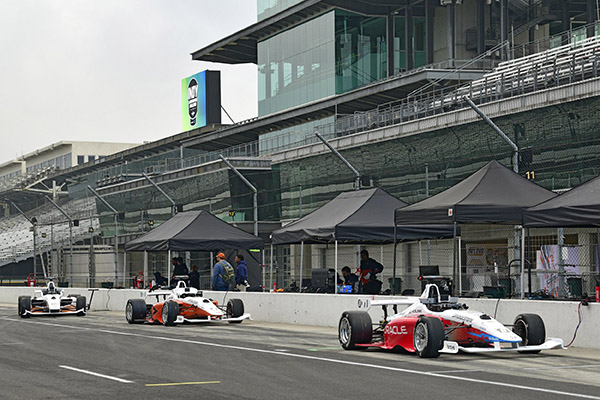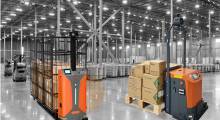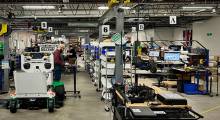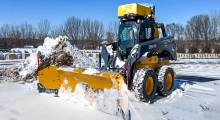Self-driving racecars are revving up for more races. The Indy Autonomous Challenge today announced that it is partnering with the Autoware Foundation, or AWF, to relaunch its Autonomous Challenge SIM races to enable simulation replicating real-world racecars. Autonoma will provide the advanced modeling integrated with the AWF's open-source AWSIM.
“Autoware Foundation’s years of experience with open-source simulation and their global network of more than 18 universities makes them the perfect partner to enable a scalable platform for autonomous SIM racing,” stated Paul Mitchell, president of the IAC. “This partnership will allow us to extend the boundaries of the IAC as the number of university teams will not be limited to the physical vehicles.”
In addition, the Indy Autonomous Challenge (IAC) teams are preparing for a road race at the Milano Monza Motor Show from June 16 to 18 in Italy. After that, the IAC will overhaul the Dellara AV-21 racecars to AV-23 for their next race at CES 2024 in Las Vegas.
“In between events, there's a tone of work that goes into deciding what technology goes into the cars and adjusting them as a representation of the available tech that's the most cutting-edge,” Mitchell told Robotics 24/7. “Between Monza and Vegas, everything comes back to Indianapolis, where a team of engineers, suppliers, and vendors specialized in motor sports decides how to improve them.”
Indy Autonomous Challenge races on
The Indy Autonomous Challenge has organized competitions for university-affiliated teams from around the world to program fully autonomous racecars and compete at iconic tracks. The IAC started as a $1 million prize competition, which included top engineering and technology universities from 11 countries and 15 U.S. states.
The Indianapolis-based organization said it is working to establish a hub for performance automation in Indiana and is using competitions to attract talent to advance autonomous vehicle safety and performance. IAC includes 25 experts in racecar repair and manufacturing, as well as a core team of seven engineers and technicians who integrate hardware and software into the vehicles, said Mitchell.
“Plus, the suppliers are involved in the process, including Luminar for lidar, Continental for radar, Cisco for communications, and Bridgestone for tires,” he explained. “There aren't a lot of real-world examples of all these technologies working together, from engines and wiring harnesses to sensors and software.”
IAC has hosted four oval competitions, with one IAC team setting a world record for autonomous racing on an oval track reaching 180 mph at Las Vegas Motor Speedway on Jan. 7, 2023. That same team, PoliMOVE, also holds the world’s fastest autonomous land-speed record of 309.3 kph (192.2 mph) over 1 km.
The races have been popular with the public, but they're focused on encouraging innovation among the teams rather than becoming a competition circuit, noted Mitchell. Why would conventional automakers care about such self-driving car races?
“The interest from the automotive industry has been very broad, which is extremely positive,” replied Mitchell. “There's an increasing recognition that if you can prove a technology can work at extreme speeds, temperatures, and vibrations, the level of confidence that it will work in less-rigorous use cases goes up. Over multiple trials and races, our racecars have traveled thousands of miles at over 100 mph.”
Autonomous Challenge SIM
In addition to physical races, the Indy Autonomous Challenge organized a series of simulated races in 2020 and 2021, partly in response to travel restrictions due to the COVID-19 pandemic. They allowed 31 teams from 40 universities across four continents to test their artificial intelligence drivers and determine their readiness to compete in on-track competitions.
The IAC said it plans to re-launch its simulation races with AWF “to expand the number of university teams developing and training novel AI driving algorithms.” The SIM races widen access for teams to participate in autonomous racing by reducing the barriers of funding or physical car availability, noted the organizations.
“We worked closely with IAC to enable the reference autonomy software on the Dallara AV-21 race car used in the first IAC competition at Indianapolis Motor Speedway, and now we’ll enable IAC teams advance autonomous driving algorithms with state-of-the-art racing simulation based on AWSIM,” said Christian John, TIER IV North America president and AWF Strategic Planning Committee chair.
TIER IV created the Autoware open-source software for autonomous driving (AD). It also provides full-stack systems for the commercialization of intelligent vehicles based on the Autoware-defined Autonomous Driving Kit (ADK), which runs on multiple platforms.
AWSIM is the Unity-based simulation platform for autonomous vehicle testing developed by TIER IV and Robotec.ai. AWF members have used it to develop Autoware.
Autoware is based on ROS 2 following best-in-class software engineering practices, said the Autoware Foundation. Hundreds of companies around the world are using it, with field operation tests in about 20 countries with 30 types of vehicles, said the foundation.
Autonoma to integrate data, simulations
AWF is working closely with Autonoma, which was founded by previous IAC competitors from Auburn University and Politecnico di Milano. Autonoma said it is integrating its vehicle dynamics, tire dynamics, sensor models, vehicle interfaces, simulation framework, and 3D racetrack environments into AWSIM, allowing the IAC teams to test the performance of their autonomous software with high accuracy.
Autonoma claimed that it focuses on simulation and validation tools for autonomous vehicles to close the gap between the virtual world and the real world. Its high-fidelity, vehicle-in-the-loop (VIL) testing platform allows physical cars to“see” a dynamic virtual world around them, said the company.
Autonoma said it has been working closely with IAC university teams over the past year to develop and beta-test the simulation to fit their exact needs, creating digital twins of the racecars and competition environments.
“By offering a highly accurate simulation platform, we empower teams to push the envelope of their software, safely and efficiently,” said Will Bryan, CEO of Autonoma. “By enabling faster iteration speed, our technology not only promotes competition; it [also] equips the teams with the tools necessary to create meaningful breakthroughs that will shape our autonomous future.”
The IAC SIM racing platform is already available for current IAC university teams and will be available to new teams later this summer. Teams interested in participating in IAC SIM racing events can reach out to [email protected].
About the Author
Follow Robotics 24/7 on Linkedin
Article topics
Email Sign Up
















